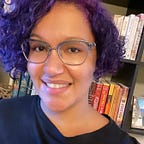My Latinidad Isn’t Up For Cancellation
I have had a complicated relationship with race since childhood. I remember filling out a form for a standardized test in middle school and checking off every single race box, just to be difficult. Racial categories felt limiting. I knew I was Puerto Rican, and I identified as Latina because my mom did. She had taught me to say no whenever someone asked if I was Spanish (“we’re not from Spain”) and she passed on her distaste for the word Hispanic — it sounded too much like the slur frequently hurled at her by other kids after she moved to Massachusetts in the 1960s.
Over the past couple of years, I’ve seen increasing calls on social media to cancel the term “Latino” (in all permutations,) alongside celebrations of Latinidad*. Alan Pelaez Lopez, a proudly Afroindigenous artist and writer, is credited with creating the “Latinidad is canceled” hashtag in 2018. Lopez has been vocal on social media about how Latinidad has failed Black, Indigenous and queer people of Latin American descent. Similarly, in a piece written last fall for Hispanic Heritage Month, Afro-Panamanian journalist Dash Harris Machado denounced her Latinidad and characterized Latinx Heritage Month as a form of Stockholm Syndrome.
I am a proud Latina. I know that it is an umbrella term encompassing a multitude of ethnic and racial identities. I understand that we are so much more than a single “market” or voting bloc; we are not a monolith. But Latinx peoples have experienced similar marginalization and othering in the U.S., and I believe we share cultural traits and values that enable us to connect with each other. There is power in Latinidad.
Don’t get me wrong. Anti-Blackness in Latin America and in the U.S. Latinx community is ubiquitous, as is anti-indigenous violence and erasure. Latin American history is rife with whitening campaigns and genocide. I’m not arguing against this and have written before about my experiences with anti-Blackness in the Latinx community. Recently, I found myself frustrated at the number of social media posts decrying the fact that no Latino had been nominated in a major category at the Oscars — completely eliding the fact that Shaka King, director of Best Picture nominee Judas and the Black Messiah, is of Panamanian descent. We must continue to challenge the marginalization and invisibility of Afro-Latinos, which begins in the Latinx community itself.
Harris and others argue that self-identifying with the label “Latino” — a word with European roots — is actually aligning oneself with white supremacy. But the Latinidad I embrace strives to be anti-racist, anti-imperialist, and decolonial. It acknowledges Iberian heritage without putting it on a pedestal and does not erase indigeneity and Blackness. My Latinidad is grounded in histories of oppression as well as resistance, and actively fights against marginalization. I interrogate my Latinidad without denouncing it.
I recently participated in my last monthly seminar as a Latino Leaders Fellow through Latinos For Education. My cohort faced the challenge of being fully remote, but over the past nine months we built meaningful connections while learning and growing alongside each other. Our monthly sessions covered topics ranging from the nuts and bolts of education policy to how we can lead from our authentic identities. We crafted narratives of self, developed personal mission statements, and engaged with difficult topics like racism and colorism within the Latinx community. During break times and transitions, we listened to Marc Anthony, Celia Cruz, and Selena. We discussed our cultural foods and family traditions. Our individual experiences varied, just like the national and regional origins of our families — but in our virtual meeting space, we felt seen and understood.
Reflecting on this sense of belonging reminds me of the affinity space I facilitated in 2019 at a conference for high school students of color from independent schools. The Latinx group was large and diverse, and although some students were shy during ice breakers, they soon grew eager to share their stories. They talked about the stereotypes and microaggressions they encountered at school, and shared advice on standing up for themselves. Many had experienced confusion and doubt about their identities or whether they were Latinx “enough”: because they were nerdy, or did not speak Spanish, or because someone had judged their skin “too dark” or “too light” to be Latinx. We talked about feminine gender norms, machismo, and the intersection of being Latinx and queer. I remember that on the last day of the conference, some of the kids cried in our affinity space. They talked about the power of being surrounded by people like themselves, and they didn’t want it to end.
Latinidad may be a social construction, but the solidarity is real.
I believe we can critique Latinx identity without outright “canceling” it.
*Loosely translates to “Latino-ness”
